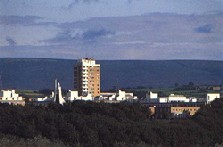Local features #1.


My native Lancashire
by
Robert L. Fielding
The only member of my family to be born in Lancashire, I travel a long way every summer to be here with them.
Like them, Lancashire is much changed – on the surface and in parts (the northern boundary was once the River Duddon, in what is now called Cumbria) – but also like them, underneath, it remains unchanged – much loved – missed greatly for ten months of the year.
The skies of Lancashire change constantly – but there are patches of blue in between the grey clouds that I hardly ever remember until I stand under them. Quiet until mid August when the Premiership gets going, The Reebok Stadium rears up in the sunlight like something out of War of the Worlds, while the long sheds of Horwich Carriage Works remain in the long shadows of the hills, east of Bolton.
The green hills flash by speeding up the M61 – Preston and Lancaster rushing up on big blue signs - the M6 – Forton Services and the gentle undulations of the Fylde peninsula, bounded by the Ribble and the Wyre give way to the terminal moraines of Cockerham and Thurnham – the geomorphology of more glacial times under changeful Lancashire skies, and former cotton mills now used for summat else entirely – Botany Village!
Then we near busy Glasson Dock, looking slightly less busy now that the Isle of Man steamer the King Orry has gone – and Coniston Old Man (once the highest point in Lancashire), and the mighty machine shops and sheds of Vickers at Barrow in Furness, birthplace of nuclear subs, with Black Combe (dread name) to the north looking over
Walney Island, and Ulverston, birthplace of Stan Laurel and commemorated in the town by the Laurel and Hardy Museum where me and my mates once spent a wet afternoon sitting in old cinema seats roaring at the Sons of the Desert on video. Cockerham Sands is our destination for today – the frowning monoliths of Heysham Nuclear Power Station dominate the shore of empty channels - boats left high and dry by the vanishing tides that were too quick for a bunch of Chinese cocklers a while back, poor lads.
The caravan is soon set up and day trips out are easy, attractions near. Sunday’s mammoth car boot sale at St. Michael’s on Wyre beckons us as it does a lot more – where else but a car boot sale can you pick up, look at and put down again – books, videos, antiques, not so antique items, real oddments – an eclectic display of bric-a-brac and household hand-me-downs, the sometimes useful and the mostly useless - thousands of cars parking free, hundreds of stallholders at eight quid a piece and all going to a charity to fight cancer. I managed to find a copy of that marvelous Richard Attenborough/Bryan Forbes film, ‘Whistle Down the Wind’ with Bernard Lee and his delightfully wayward children –
Kathy, Nan, and little Charles, and their remarkable discovery in the barn of their farm on the moors above Burnley.
An evening run up to Silverdale and Arnside – mustering point of the cross Morecambe Bay Walk from Kents Bank, a precarious walk only ever best tackled with a pilot who knows the treacherous sands like the back of his hand. The tide rushing in – fast as a galloping horse, and anglers who could once find flatfish in the tidal mudflats by standing on them with their bare feet.
And returning – getting lost in the little lanes that weave around Arnside Knott, incredibly, a signpost to Gibraltar, and on past the most romantic railway station in the world – Carnforth
a brief encounter on the London-Carlisle line. A morning stroll to Cockersands Abbey – the white brush strokes of Lancaster University and the tall student accommodation block - Bowland Tower - across the meadows, deceptively close, a longer way than the crow flies – a lot longer around the winding roads and lanes by Thurnham and Glasson Dock, Galgate and Alexandra Park (newly built accommodation for students at the Bailrigg Campus).
Heysham Power Station looms again after breakfast – the Battery Hotel and then a promise to myself – a visit to see Eric Bartholomew (Morecambe) – his statue laughing down the steps to circles with the biggest names in showbiz written on them. The steps, with the words of Eric and Ernie ’ s signature tune – ‘ Bring me sunshine’, and some of Eric’s memorable lines – ‘ What do you think of the show so far? ’ – inviting the answer, ‘Rubbish!’ – ‘Some tea, Ern?’ and Eric’s refrain of ‘Bumm ooh ya-ta-ta-ta’ to Ernie’s singing ‘Will you miss me tonight when I’m gone?’ Both sadly missed, by me and another bloke paying homage as I was, wondering why they weren’t both at the top of the steps, united in death, and in our hearts and our memories Eric and Ernie – Morecambe and Wise.
The Freeport in Fleetwood – famous names (I didn’t recognize any of ‘em, but what do I know?) at knock down prices, and then roadside signs for a Steam Engine Rally at Hambleton, farm grown new potatoes everywhere, a pottery at Pilling, caravan sales, and the pleasant flowery greenery of Lancashire, west of the heathery moors of the Trough of Bowland, and I recall the sad loss of Pat Seed’s beloved husband in an underground reservoir one evening at Abbeysteads – Lancashire – my Lancashire – the one that is out there, and easy to find, if you know where to look.
Robert Leslie Fielding

0 Comments:
Post a Comment
<< Home